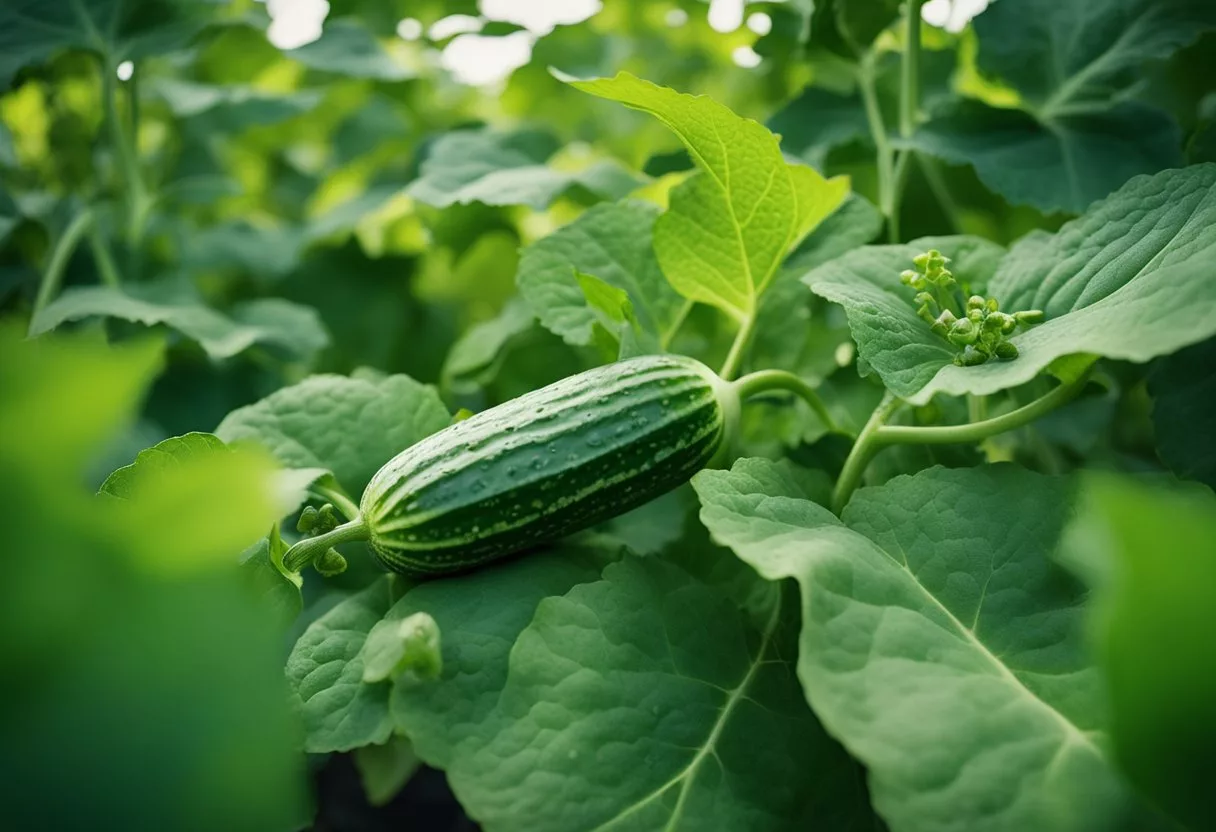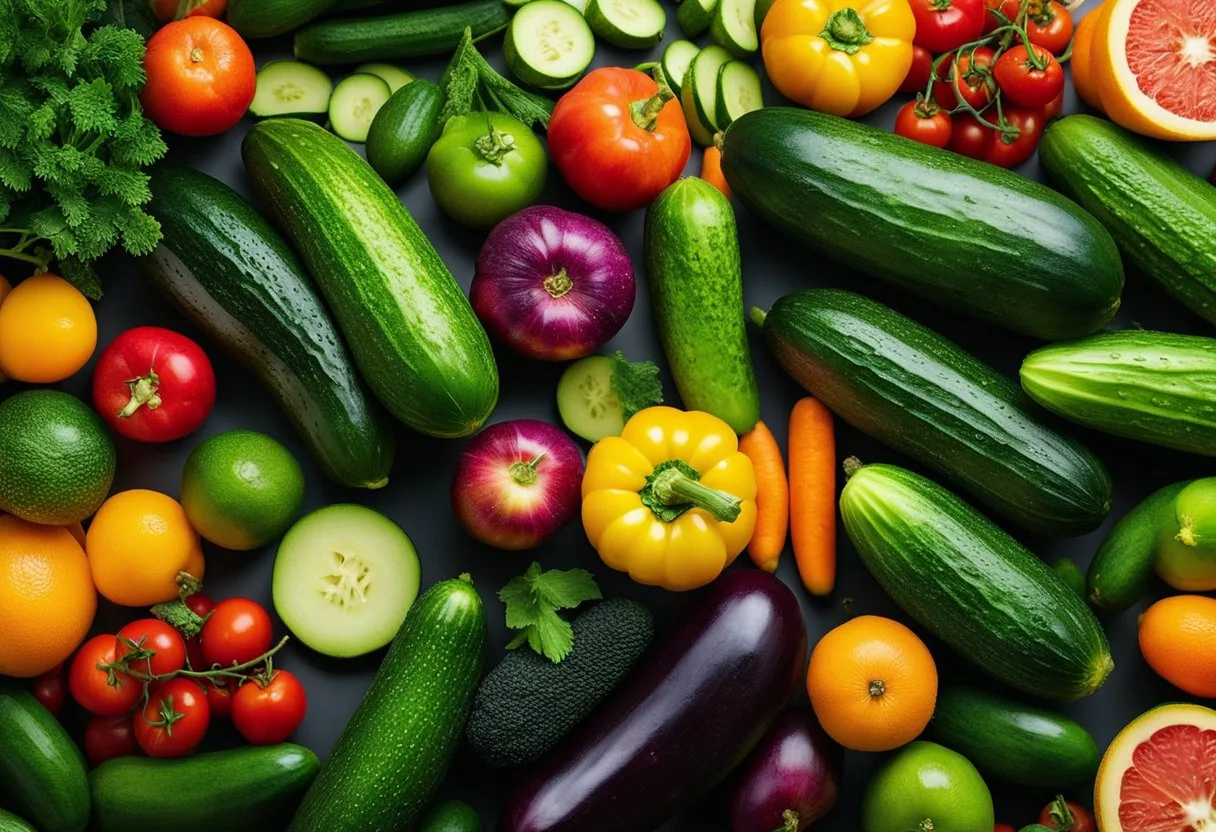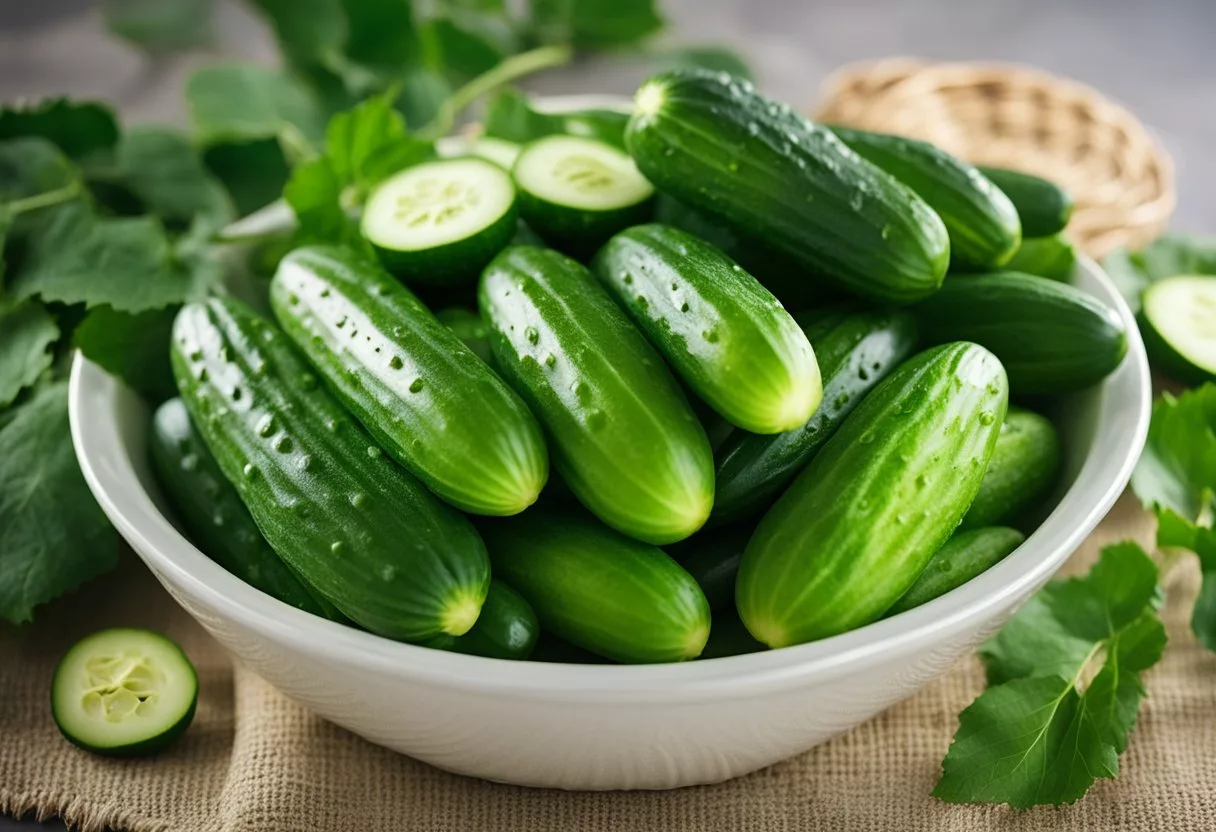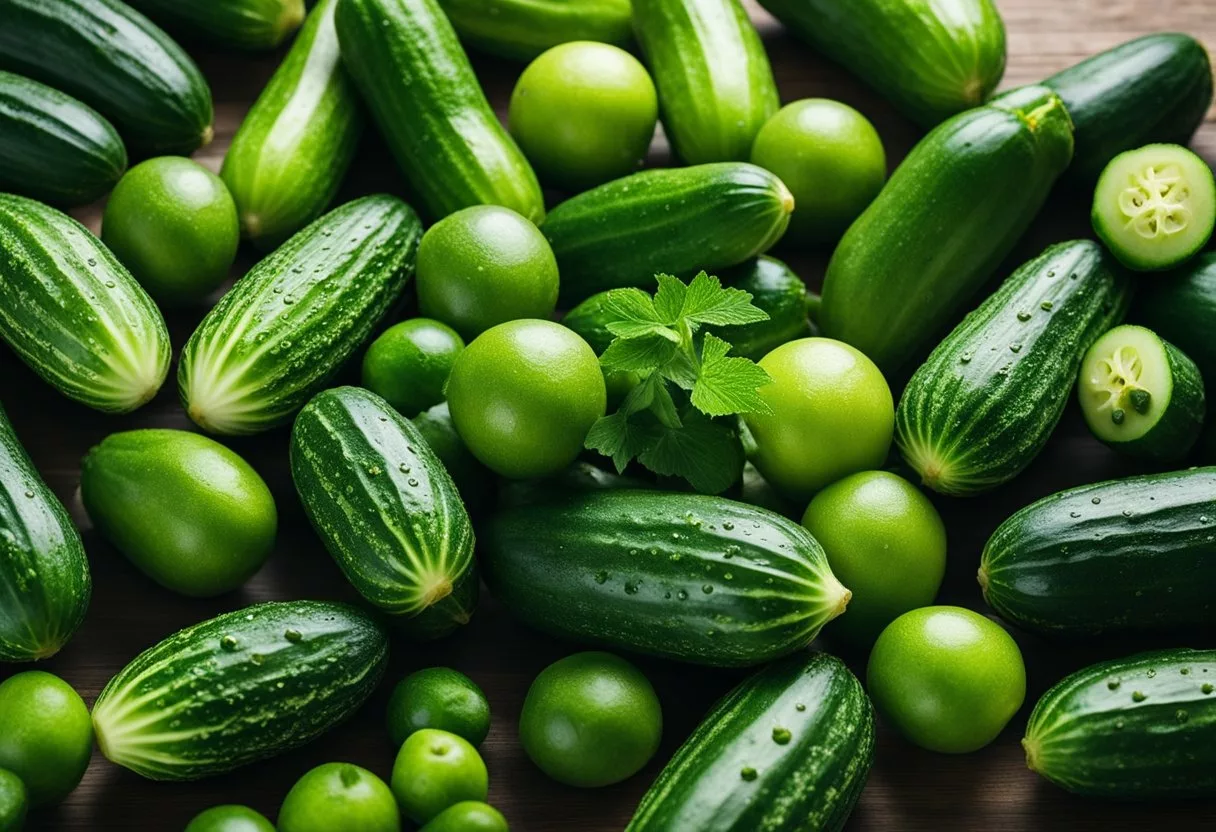Eating a healthy diet is essential to maintaining good health. One food that is often recommended for its numerous health benefits is cucumber. Cucumbers are a low-calorie vegetable that are packed with nutrients and can be eaten in a variety of ways. But what happens to your body if you eat cucumber every day?

Cucumbers are a great source of hydration, as they are made up of over 90% water. Eating cucumbers can help to keep the body hydrated, which is important for maintaining healthy skin, hair, and nails. In addition, cucumbers are rich in vitamins and minerals, including vitamin C, vitamin K, and potassium. Vitamin C is important for immune function, while vitamin K is essential for bone health. Potassium helps to regulate blood pressure and supports heart health.
Some studies have also suggested that cucumbers may have anti-inflammatory properties and could help to prevent certain types of cancer. However, more research is needed to confirm these findings. Overall, incorporating cucumbers into your diet can be a great way to support overall health and well-being.
Nutritional Profile of Cucumbers

Cucumbers are a nutritious and refreshing vegetable that can be enjoyed in a variety of ways. They are low in calories and high in water content, making them a great choice for those looking to maintain a healthy weight or stay hydrated. In this section, we will explore the nutritional profile of cucumbers and the health benefits they offer.
Vitamins and Minerals
Cucumbers are a good source of several essential vitamins and minerals. They are particularly rich in potassium, which is important for maintaining healthy blood pressure levels and supporting proper muscle and nerve function. Cucumbers also contain vitamin K, which is essential for healthy blood clotting and bone health. Additionally, they are a good source of vitamin C, which is important for immune function and skin health.
Hydration and Water Content
One of the main benefits of cucumbers is their high water content. In fact, cucumbers are made up of over 95% water, making them an excellent choice for staying hydrated. Eating cucumbers can help replenish fluids lost during exercise or hot weather, and can also help promote healthy digestion and bowel regularity.
Fiber Content
Cucumbers are a good source of dietary fiber, which is important for maintaining healthy digestion and preventing constipation. Fiber also helps regulate blood sugar levels and can help lower cholesterol levels. Eating cucumbers with the skin on can help increase your fiber intake, as the skin contains most of the vegetable’s fiber.
Overall, cucumbers are a healthy and nutritious vegetable that can be enjoyed as a snack or added to salads, sandwiches, and other dishes. They are low in calories, high in water content, and a good source of several essential vitamins and minerals. Incorporating cucumbers into your diet can help support overall health and wellness.
Health Benefits of Daily Cucumber Consumption

Cucumbers are a great addition to any diet, as they are not only low in calories, but also packed with nutrition. Eating cucumbers every day can provide numerous health benefits, including improved hydration, skin health, digestion, weight management, heart health, and blood sugar regulation.
Hydration and Skin Health
Cucumbers are composed mostly of water and can help keep the body hydrated. Additionally, cucumbers contain vitamin C and caffeic acid, both of which help soothe skin irritations and reduce swelling. Applying cucumber slices to the skin can also help reduce puffiness around the eyes.
Digestive Health
Cucumbers are a good source of fiber, which can help promote regular bowel movements and prevent constipation. They also contain a compound called cucurbitacin, which has been shown to have anti-inflammatory properties and may help protect against certain types of cancer.
Weight Management
Cucumbers are low in calories and high in water content, making them a great addition to any weight loss plan. Eating cucumbers can help you feel full without consuming too many calories, which can lead to weight loss over time.
Heart Health
Cucumbers contain potassium, which has been linked to a decreased risk of cardiovascular disease. Additionally, cucumbers are low in sodium, which can help lower blood pressure and reduce the risk of heart disease.
Blood Sugar Regulation
Eating cucumbers may help regulate blood sugar levels, making them a great choice for people with diabetes. Cucumbers contain a compound called cucurbitacin, which has been shown to have anti-diabetic properties.
In conclusion, adding cucumbers to your daily diet can provide numerous health benefits. Whether you are looking to improve hydration, skin health, digestion, weight management, heart health, or blood sugar regulation, cucumbers are a great choice.
Potential Risks and Considerations

Pesticide Exposure
While cucumbers are generally safe to eat, conventionally grown cucumbers may contain pesticide residue. According to the Environmental Working Group, cucumbers are on their “Dirty Dozen” list of produce with the highest levels of pesticide residue. To minimize exposure to pesticides, it is recommended to choose organic cucumbers whenever possible.
Allergies and Intolerances
Although rare, some people may have an allergy or intolerance to cucumbers. Symptoms of an allergic reaction can include itching, hives, swelling, and difficulty breathing. In some cases, consuming cucumbers can also cause a condition called oral allergy syndrome, which can cause itching and swelling in the mouth and throat. If you experience any of these symptoms after eating cucumbers, it is recommended to stop consuming them and seek medical attention.
Warfarin Interaction
Cucumbers contain vitamin K, which can interfere with the blood-thinning medication warfarin. People who are taking warfarin should talk to their healthcare provider before consuming cucumbers or any other food that is high in vitamin K. It may be necessary to adjust the dosage of warfarin or avoid consuming vitamin K-rich foods altogether.
Overall, cucumbers are a healthy and nutritious food that can be enjoyed as part of a balanced diet. However, it is important to be aware of the potential risks and considerations associated with consuming cucumbers, especially if you have allergies, are taking warfarin, or are concerned about pesticide exposure.
Cucumber Varieties and Culinary Uses

Common Varieties
Cucumbers come in various shapes and sizes, and each variety has its own unique flavor profile and texture. Some of the most common cucumber varieties include:
- Burpless Cucumbers: These cucumbers are known for their thin skin and sweet flavor. They are ideal for salads and sandwiches.
- English Cucumbers: Also known as hothouse cucumbers, they are long and slender with a mild flavor. They are perfect for snacking, salads, and sandwiches.
- Kirby Cucumbers: These small cucumbers are ideal for pickling due to their firm texture and small size.
- Persian Cucumbers: These cucumbers are small and crunchy with a sweet flavor. They are perfect for snacking and salads.
Culinary Applications
Cucumbers are a versatile vegetable that can be used in a variety of culinary applications. Here are a few ways to use cucumbers:
- Salads: Cucumbers are a staple ingredient in salads. They add a refreshing crunch and a mild flavor that pairs well with a variety of dressings and toppings.
- Snacks: Cucumbers make a great snack on their own or paired with hummus or tzatziki.
- Sandwiches: Cucumbers add texture and flavor to sandwiches. They pair well with meats, cheeses, and other vegetables.
- Pickled: Kirby cucumbers are ideal for pickling. They can be pickled in a variety of brines and spices to create a tangy and flavorful snack or condiment.
In summary, cucumbers are a versatile vegetable with a variety of culinary applications. Whether you’re looking for a refreshing snack or a crunchy addition to your salad, there is a cucumber variety that will meet your needs.
Incorporating Cucumbers into Your Diet

Cucumbers are a versatile and refreshing vegetable that can be incorporated into your diet in a variety of ways. Here are some ideas for using cucumbers in your meals.
Recipes and Ideas
- Salads: Cucumbers are a common ingredient in salads, adding a crisp and refreshing texture. Try adding cucumbers to a classic garden salad, or mix them with tomatoes and feta cheese for a Greek-style salad.
- Sandwiches: Sliced cucumbers can add a refreshing crunch to sandwiches, especially when paired with creamy spreads like hummus or tzatziki.
- Pickles: Cucumbers can be pickled in vinegar or brine to create a tangy and flavorful snack.
- Smoothies: Cucumbers can be blended into smoothies for a refreshing and hydrating drink. Try mixing cucumbers with mint, lime, and honey for a delicious summer beverage.
Storage and Preservation
To keep cucumbers fresh, it’s important to store them properly. Here are some tips for storing and preserving cucumbers:
- Garden: If you have a garden, cucumbers can be harvested when they are firm and green. Be sure to pick them before they turn yellow, as this indicates that they are overripe.
- Store: Cucumbers can be stored in the refrigerator for up to a week. To prevent them from becoming mushy, store them in a plastic bag or wrap them in a damp towel.
- Salad Dressing: Cucumbers can be blended with yogurt or sour cream to create a creamy salad dressing. This dressing can be stored in the refrigerator for up to a week.
Incorporating cucumbers into your diet is a simple and delicious way to add a variety of nutrients to your meals. With these ideas for using and storing cucumbers, you can enjoy this refreshing vegetable all year round.
Understanding Cucumbers in the Broader Context of Health

Comparative Nutritional Analysis
Cucumbers are a low-calorie, nutrient-dense food that can be a valuable addition to a healthy diet. They are particularly rich in water, with a cucumber being over 95% water by weight. Cucumbers also contain several important vitamins and minerals, including vitamin K, vitamin C, potassium, and magnesium.
When compared to other common vegetables, cucumbers are relatively low in calories and carbohydrates. For example, one cup of sliced cucumbers contains only 16 calories and 3.6 grams of carbohydrates. This makes cucumbers a good choice for people who are trying to lose weight or manage their blood sugar levels.
Role in Disease Prevention
Cucumbers have been studied for their potential health benefits, particularly in the areas of cancer prevention, heart health, and diabetes management. While the evidence is still limited, some studies suggest that cucumbers may have anti-cancer properties due to their high antioxidant content. Antioxidants are compounds that can neutralize free radicals, which are unstable molecules that can damage cells and contribute to the development of cancer and other diseases.
Cucumbers may also have anti-inflammatory properties, which could be beneficial for people with conditions such as heart disease and diabetes. Chronic inflammation is thought to play a role in the development of these conditions, and reducing inflammation may help to prevent or manage them.
In addition to their potential health benefits, cucumbers are a versatile and tasty addition to many meals and snacks. They can be sliced and eaten raw, added to salads or sandwiches, or blended into smoothies. Overall, incorporating cucumbers into a healthy diet can be a simple and effective way to support overall health and well-being.